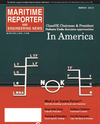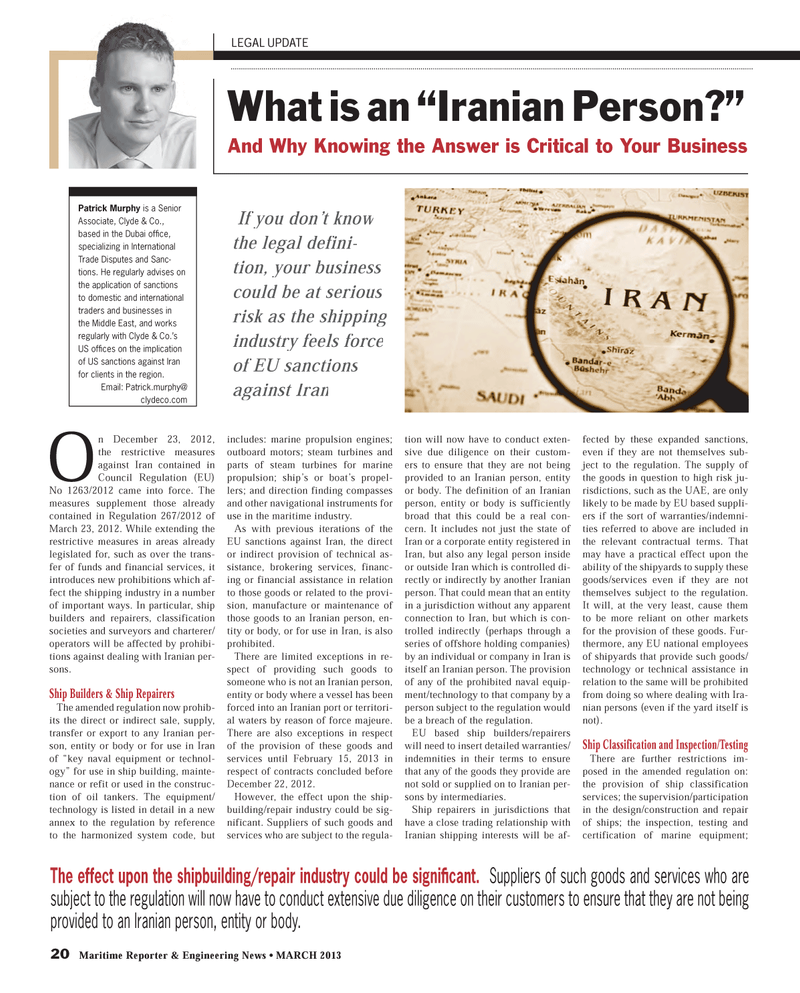
Page 20: of Maritime Reporter Magazine (March 2013)
U.S. Coast Guard Annual
Read this page in Pdf, Flash or Html5 edition of March 2013 Maritime Reporter Magazine
20 Maritime Reporter & Engineering News ? MARCH 2013 LEGAL UPDATE What is an ?Iranian Person??Patrick Murphy is a Senior Associate, Clyde & Co., based in the Dubai ofÞ ce, specializing in International Trade Disputes and Sanc- tions. He regularly advises on the application of sanctions to domestic and international traders and businesses in the Middle East, and works regularly with Clyde & Co.Õs US ofÞ ces on the implication of US sanctions against Iran for clients in the region. Email: [email protected] December 23, 2012, the restrictive measures against Iran contained in Council Regulation (EU) No 1263/2012 came into force. The measures supplement those already contained in Regulation 267/2012 of March 23, 2012. While extending the restrictive measures in areas already legislated for, such as over the trans- fer of funds and financial services, it introduces new prohibitions which af-fect the shipping industry in a number of important ways. In particular, ship builders and repairers, classification societies and surveyors and charterer/operators will be affected by prohibi- tions against dealing with Iranian per- sons.Ship Builders & Ship Repairers The amended regulation now prohib-its the direct or indirect sale, supply, transfer or export to any Iranian per- son, entity or body or for use in Iran of ?key naval equipment or technol-ogy? for use in ship building, mainte-nance or refit or used in the construc-tion of oil tankers. The equipment/ technology is listed in detail in a new annex to the regulation by reference to the harmonized system code, but includes: marine propulsion engines; outboard motors; steam turbines and parts of steam turbines for marine propulsion; ship?s or boat?s propel- lers; and direction finding compasses and other navigational instruments for use in the maritime industry. As with previous iterations of the EU sanctions against Iran, the direct or indirect provision of technical as-sistance, brokering services, financ-ing or financial assistance in relation to those goods or related to the provi-sion, manufacture or maintenance of those goods to an Iranian person, en-tity or body, or for use in Iran, is also prohibited.There are limited exceptions in re-spect of providing such goods to someone who is not an Iranian person, entity or body where a vessel has been forced into an Iranian port or territori-al waters by reason of force majeure. There are also exceptions in respect of the provision of these goods and services until February 15, 2013 in respect of contracts concluded before December 22, 2012.However, the effect upon the ship- building/repair industry could be sig-nificant. Suppliers of such goods and services who are subject to the regula-tion will now have to conduct exten-sive due diligence on their custom-ers to ensure that they are not being provided to an Iranian person, entity or body. The definition of an Iranian person, entity or body is sufficiently broad that this could be a real con-cern. It includes not just the state of Iran or a corporate entity registered in Iran, but also any legal person inside or outside Iran which is controlled di-rectly or indirectly by another Iranian person. That could mean that an entity in a jurisdiction without any apparent connection to Iran, but which is con-trolled indirectly (perhaps through a series of offshore holding companies) by an individual or company in Iran is itself an Iranian person. The provision of any of the prohibited naval equip-ment/technology to that company by a person subject to the regulation would be a breach of the regulation.EU based ship builders/repairers will need to insert detailed warranties/indemnities in their terms to ensure that any of the goods they provide are not sold or supplied on to Iranian per- sons by intermediaries.Ship repairers in jurisdictions that have a close trading relationship with Iranian shipping interests will be af-fected by these expanded sanctions, even if they are not themselves sub-ject to the regulation. The supply of the goods in question to high risk ju-risdictions, such as the UAE, are only likely to be made by EU based suppli-ers if the sort of warranties/indemni-ties referred to above are included in the relevant contractual terms. That may have a practical effect upon the ability of the shipyards to supply these goods/services even if they are not themselves subject to the regulation. It will, at the very least, cause them to be more reliant on other markets for the provision of these goods. Fur- thermore, any EU national employees of shipyards that provide such goods/technology or technical assistance in relation to the same will be prohibited from doing so where dealing with Ira-nian persons (even if the yard itself is not).Ship Classification and Inspection/Testing There are further restrictions im-posed in the amended regulation on: the provision of ship classification services; the supervision/participation in the design/construction and repair of ships; the inspection, testing and certification of marine equipment; And Why Knowing the Answer is Critical to Your Business If you don?t know the legal defini-tion, your business could be at serious risk as the shipping industry feels force of EU sanctions against IranThe effect upon the shipbuilding/repair industry could be signiÞ cant. Suppliers of such goods and services who are subject to the regulation will now have to conduct extensive due diligence on their customers to ensure that they are not being provided to an Iranian person, entity or body. MR #3 (18-25).indd 20MR #3 (18-25).indd 202/26/2013 3:51:29 PM2/26/2013 3:51:29 PM

 19
19

 21
21
